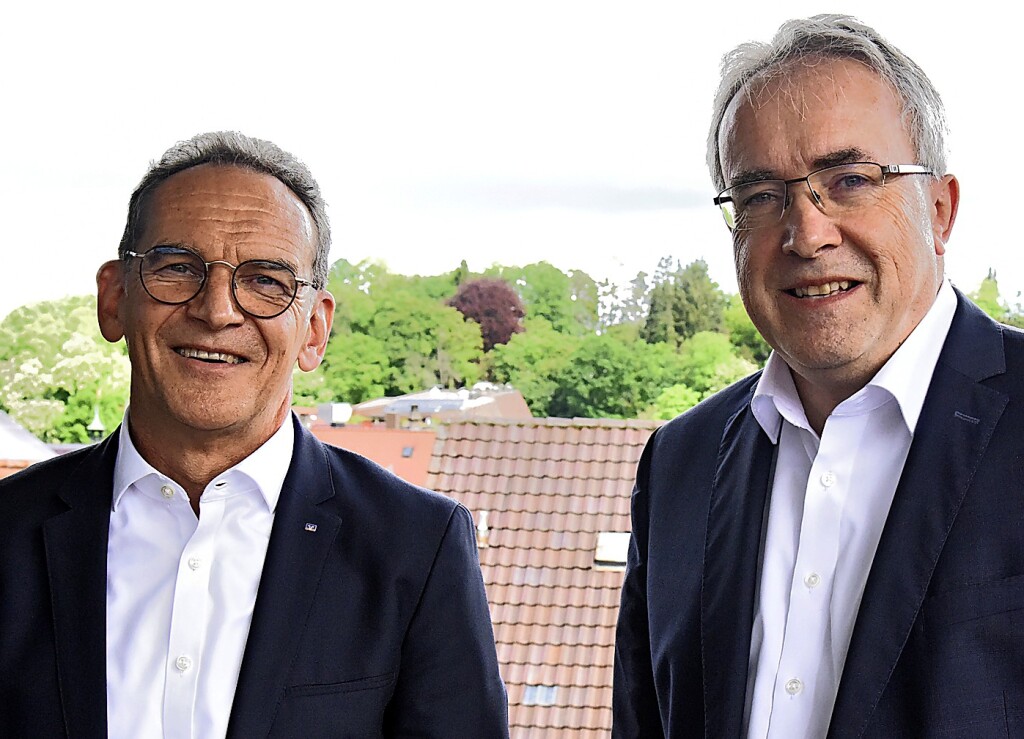Karl-Heinz Dreher and Markus Singler have been on the board of Volksbank for 24 years and are now retiring together.
. Karl-Heinz Dreher and Markus Singler were born and raised in Elzach, albeit seven years apart. They saw the light of day there in the long-closed hospital. For 24 years, as members of the board of directors of Volksbank Breisgau-Nord, they were jointly responsible for the largest cooperative financial institution in the Emmendingen district with 80,000 customers and 40,000 members. At the end of June they will be leaving together and will retire.
“Actually, I wanted to study sport after graduating from high school,” said Dreher when banking was not the top priority when choosing a career. However, due to an accident, he had to change his mind. At Volksbank Freiburg he began his training as a banker, where he then worked for a long time in the corporate customer area. “At 40 you have to be a member of the board,” he remembers the advice of a teacher at the Walter-Eucken-Gewerbeschule. He was appointed to the Board of Management of Volksbank Waldkirch on June 1, 1996.
There he met Markus Singler, who had started his apprenticeship at Volksbank in the Kandelstadt in August 1980. “As a ten-year-old I rolled 10-pfennig coins, grandma’s rummy play money, in paper.” His dream job emerged early on. He had only briefly considered becoming a teacher. Over the years, Singler took on more and more responsibility in the bank. Since May 1997 Dreher and Singler were both board members of the bank, which merged with Volksbank Emmendingen in 2002. Looking back, for both of them “before the feelers were put out in the other direction”, it was a spot on and probably the most important decision of their board life.
The outgoing board members also agree on what was most important to them personally in their work. “Contact with people, advising and accompanying them,” was a top priority for Dreher. “I worked in direct customer business for 38 years,” says Singler as a carer. He has accompanied many of them from financing their first own car to owning a home and beyond. “It wasn’t just success,” said Dreher. “With some we are through phases in which Spitz had to be reckoned with,” says Singler.
Regionality was the key to success. Also, “because we live in a blessed region with a high degree of industry diversity,” emphasizes Dreher. Especially in the crisis of 2008 to 2010 it paid off that “we as a regional bank are not trying to turn the big wheel”. Also with the result that customer volume and equity have doubled in the past ten years. “For me, the necessity of downsizing was personally difficult,” said Dreher, for whom the employees are still the best capital of a bank. Mutual appreciation and trust within the bank, but also with customers, are priceless.
“It is clear that the banking world in 2030 will look different than it is today,” Dreher is pleased that an internal successor has been found for the board in Patrick Heil and Fritz Schultis. As generalists familiar with the bank, they are well prepared, even for difficult times. Dreher currently sees its regional business partners more heavily burdened by Corona than during the financial crisis and Singler hopes “that there will be no fourth wave, because some of them could no longer survive”.
Even if you are never just a private person as a bank manager, Dreher was able to switch off while cycling and skiing, and football and athletics provided a balance from everyday life. “I have a large group of friends outside of the banking world,” said Dreher. Many of them have been with him since primary school. It is worth a lot, do well, with which to raise other topics. Not to be lethargic physically and mentally remains valuable to him.
Singler found the necessary balance with hiking and tennis, so he decided to cross the Black Forest from north to south on the Westweg with his wife, who is also retiring from work. But he was already drawn into the distance, Canada was a destination, Australia should become one “when it is possible again”. Otherwise, he first wants to enjoy the freedom that early retirement at 58 gives him. “My own planning was for that when I was 60,” says Singler. When the supervisory board brought up the earlier variant in the course of the upcoming generation change, it only considered briefly. But he also wants to look for new tasks for 2022. “I will get involved somewhere, less in the banking sector, more in the social field.”
“Nothing,” replies Dreher when asked about his retirement plans. First of all, he only planned free time and he hopes it will work. Having time with your wife and family and for the mountains, hiking and skiing. The Rohrhardsberg is one of his favorite places and like his whole life so far, he is not drawn to the big wide world. “There are blessed landscapes in the immediate vicinity, Europe offers beautiful travel destinations,” he emphasizes. But ideas for a voluntary commitment have already been brought to him.
–


:quality(80)/cdn-kiosk-api.telegraaf.nl/8bddcb92-c91d-11eb-ba7b-02c309bc01c1.jpg)